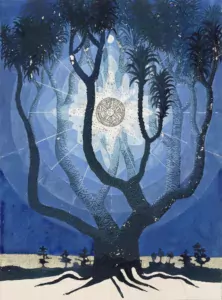There is a marketing campaign going around, featuring famous male athletes, with the message that we should stand up and “stop hate.” Lord knows there is an epidemic of hate right now, and we could certainly do with less. But while the campaign’s intention is admirable, it relies on faulty logic. Sadly, their message hinges on being against something instead of stating what they’re for. This approach uses oppositional strength and energy, and helps marginally at best. Sure, there is dignity in a strong and protective “no,” but agreeing to fight hate on its own terms just releases more oppositional energy into the world.
There is a certain coercive power in the message of “stop hate!” As a man, I immediately feel something deep inside that wants to rise up. “Yes!” it says. “Let’s go STOP those haters, let’s defend those kids.” Righteous and active, the statement summons a deep archetypal energy that is outwardly focused and readily available. But it’s an energy that doesn’t even ask me to notice my own hatred, which fuels it. How convenient and comfortable for my ego!
Had their campaign implored us to “choose love,” would that have been much better? I’m not sure. Sadly, I think it might fall flat without demonstrating love among us, love experienced between real people. This is the conundrum with love, to say nothing of belovedness. The real challenge with love, grace, mercy, equanimity—and so many of the higher states—is that we can’t know them in our mind until we have experienced them in our body and soul. And too many of us haven’t drank from the well of love lately, if ever. The idea of love, and of our related belovedness, falls so short and seems so trite compared to the lived experience of this transformative reality. Talking about love without offering, receiving, and experiencing it might be worse than doing nothing at all.
For most of my early life, I intellectually affirmed my identity as a Beloved Son, but my lived reality wasn’t shaped by the depths of this identity. To deny something outright is perhaps better than to live under the illusion that you know and believe it, when in reality you know so little of it. When we are deluded enough to think we understand, we are deaf and blind to rich realities—unable to hear the depth and profundity of a statement like: “You are a Beloved Son of God.” We are likely to shrug it off, discount it, and eventually sit in the place of cynicism. So yes, when it comes to Love, words just won’t cut it.
Perhaps part of the issue comes from way back. As a teen, I’m not sure how much I really wanted the intimacy of real radical love. I wanted respect. I wanted affirmation, esteem, regard, honor, and more—all of which I thought I could earn. But love? Love required vulnerability. It required the defenselessness of intimacy. I wasn’t ready for that. It is tragic, comic, and entirely predictable that young men are less interested in belovedness and more interested in winning the game of meritocracy. We don’t earn our belovedness, and the ego can’t take much pride in something for which it can’t take credit! It seems only after running on that treadmill for a season—and getting our share of nicks and bruises along the way—that we’re finally ready for some gospel.
So this is the state of things. Folks bumping into each other all day, aching for love, but so parched for so long, that the dull pain no longer registers in consciousness. Entertaining distractions seems to be the most prevalent treatment for anxieties. Hafiz, that glorious 14th century Sufi mystic puts it this way:
I know the way you can get
When you have not had a drink of Love:
Your face hardens,
Your sweet muscles cramp.
Children become concerned
About a strange look that appears in your eyes
Which even begins to worry your own mirror
And nose.
Squirrels and birds sense your sadness
And call an important conference in a tall tree.
They decide which secret code to chant
To help your mind and soul.
Even angels fear that brand of madness
That arrays itself against the world
And throws sharp stones and spears into
The innocent
And into one’s self.
O I know the way you can get
If you have not been drinking Love:
You might rip apart
Every sentence your friends and teachers say,
Looking for hidden clauses.
You might weigh every word on a scale
Like a dead fish.
You might pull out a ruler to measure
From every angle in your darkness
The beautiful dimensions of a heart you once
Trusted.
I know the way you can get
If you have not had a drink from
Love’s Hands.
That is why all the Great Ones speak of
The vital need To keep remembering God,
So you will come to know and see Him
As being so Playful And Wanting,
Just Wanting to help.
That is why Hafiz says:
Bring your cup near me.
For all I care about
Is quenching your thirst for freedom!
All a Sane man can ever care about
Is giving Love!
This is the crux of our work. For me and for many, the gift of the MROP is finally waking up to our Belovedness. When I awakened to the universal inheritance of my Belovedness, it felt so profound, so new, that I needed to embrace it as a name: “I am a Beloved Son of God.” At events like an MROP, and through the connections we cherish long after these events, our hearts are open for long enough to finally receive the gift, which penetrates deep into the bones. And the radical nature of belovedness is that we don’t have to do a damn thing! We can’t add to it or detract from it. It doesn’t rely on us, nor does it rest on anything as flimsy as merit. It is simply true. It stands on its own, revealing the nature of the Mystery as one which is personal and generous.
You either know it or you don’t—yet.
You can forget it, but you can’t lose it.
Love is always available, even when you’re not.
So, as Hafiz says in another poem, why not be like “the one who lives with a full moon in each eye / [who] is always saying / with that sweet moon language / what every other soul is longing to hear?”
You are loved.
Written by Ned Abenroth







Leave a Reply
Your email is safe with us.
You must be logged in to post a comment.